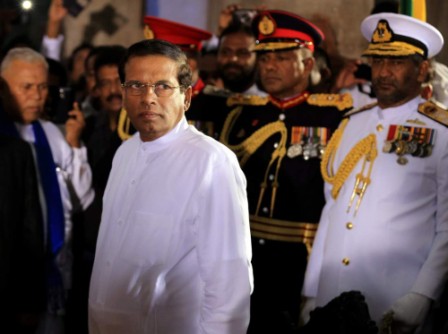Sri Lanka to set up truth commission, consider war reparations
Geneva
Sri Lanka's new unity government is planning a range of measures to ensure reconciliation after decades of war, including creating an office for war reparations and a truth commission, Foreign Minister Mangala Samaraweera said Monday.
"The government of Sri Lanka recognises fully that the process of reconciliation involves addressing the broad areas of truth seeking, justice, reparations and non-recurrence," Samaraweera told the United Nations Human Rights Council in Geneva.
He said the country aimed to create a "Commission for Truth, Justice, Reconciliation and non-recurrence" with help from authorities in South Africa and other countries that have set up their own truth commissions.
The government also wanted to set up an office to "facilitate the implementation of recommendations relating to reparations" made by the proposed truth commission and other entities, he said.
"The best guarantee for non-recurrence is of course a political settlement that addresses the grievances of the Tamil people," Samaraweera told the council.
The Human Rights Council will on Wednesday release a long-awaited report on Sri Lanka's alleged war crimes during the war against the Tamil Tiger guerillas in which at least 100,000 people died.
The report had initially been scheduled to be published in March, but UN rights chief Zeid Ra'ad Al Hussein had recommended it be delayed for six months to give the country's new government a chance to cooperate with investigators.
Sri Lankan President Maithripala Sirisena came to power in January promising reconciliation and accountability for alleged atrocities committed by troops under the command of then-president Mahinda Rajapakse.
During his decade in power, Rajapakse resisted Western pressure to investigate allegations that up to 40,000 ethnic Tamil civilians were killed by his troops in the final months of the conflict in 2009.
Rajapakse did flag setting up a South African-style truth commission in the months before his defeat in January.
- 'Meaningful accountability'-
But the idea was later dropped after Rajapakse's hardline supporters from the Sinhalese majority accused him of kowtowing to the minority Tamils.
Sirisena's government earlier this year asked the international community for advice and assistance on addressing accountability for alleged war-time atrocities.
But the government has not until now raised the issue of reparation or paying compensation to victims, including thousands of Tamils who lost family members and their homes and were forced to flee the fighting.
UN rights chief Zeid on Monday told the council he "welcomed the vision shown by President Sirisena... and the commitments made by the new government under his leadership."
But he stressed that the findings to be presented in his office's report on Wednesday were "the most serious in nature," and said the council would not let up its pressure on Sri Lanka to ensure the promised reforms are implemented.
"This council owes it to Sri Lankans and to its own credibility to ensure an accountability process that produces results, decisively moves beyond the failures of the past and brings the deep institutional changes needed to guarantee non-recurrence," he told the UN's top rights body.
The United States, which had been leading efforts at the council towards an international inquiry into the war crimes allegations, has softened its tone since the new Sri Lankan government took power.
Erin Barclay, Deputy Assistant Secretary at the US Bureau of International Organization Affairs, said the United States was working with Sri Lanka to develop a resolution to present to the Human Rights Council that could gain "consensus support".
The resolution, she said, would aim to "assist Sri Lanka in achieving meaningful and credible accountability, as well as address the important findings of OHCHR's investigative report."
Related Posts

